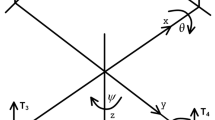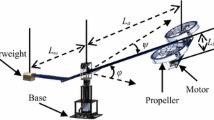Abstract
This paper presents estimation of disturbance to create a compound disturbance observer based on sliding modes. Disturbance observer(DOB) and sliding mode control are both effective methods in motion control. However, DOB is confined to nonlinear disturbance while sliding mode control(SMC) is limited by chattering phenomenon. The proposed method uses sliding mode to compensate the dynamic nonlinear equivalent disturbance and the switching gain of sliding mode, which is designed by disturbance estimation error using fuzzy mapping. The method also helps to decrease chattering with the help of DOB. The validity of the proposals is confirmed by experiments.
Access this chapter
Tax calculation will be finalised at checkout
Purchases are for personal use only
Preview
Unable to display preview. Download preview PDF.
Similar content being viewed by others
References
Liu, Q., Er, L.J.: Disturbance observer based robust tracking control of high precision flight simulator. Journal of Beijing University of Aeronautics and Astronautics 29(2), 181–184 (2003)
Ohnishi, K., Shibata, M., Murakami, T.: Motion control for advanced mechatronics. IEEE/ASME Transactions on Mechatronics 1(1), 56–67 (1996)
Grochmal, T.R., Lynch, A.F.: Precision tracking of a rotating shaft with magnetic bearings by nonlinear decoupled disturbance observers. IEEE Transactions on Control Systems Technology 15(6), 1112–1121 (2007)
Yonggu, K., Jinwook, S., Ilhwan, N., et al.: An adaptive disturbance observer for a two-link robot manipulator. In: International Conference on Control, Automation and Systems, ICCAS 2008, pp. 141–145 (2008)
Kyung-Soo, K., Keun-Ho, R., Soohyun, K.: Disturbance observer for estimating higher order disturbances in time series expansion. IEEE Transactions on Automatic Control 55(8), 1905–1911 (2010)
Wu, Y., Le, W., Tian, D.: Application of Sliding Mode Control Based on Disturbance Observer on High Performance Flight Motion Simulator. In: IEEE Inter. Conf. on Automation and Logistics, pp. 2695–2699 (2007)
Hace, A., Jezernik, K., Sabanovic, A.: SMC with Disturbance Observer for a Linear Belt Drive. IEEE Transactions on Industrial Electronics 54(6), 3402–3412 (2007)
Weibing, G., Yufu, W., Homaifa, A.: Discrete-time variable structure control systems. IEEE Transactions on Industrial Electronics 42(2), 117–122 (1995)
Young, K.D., Utkin, V.I., Ozguner, U.: A Control Engineer’s Guide to Sliding Mode Control. IEEE Trans. on Control System Technology 7(3), 328–342 (1999)
Chen, X., Komada, S., Fukuda, T.: Design of a Nonlinear Disturbance Observer. IEEE Transactions on Industrial Electronics 47(2), 429–437 (2000)
Man, Z.H., Yu, X.H., Eshraghian, K., et al.: A Robust Adaptive Sliding Mode Tracking Control Using An RBF Neural Network for Robotic Manipulators. In: Proc. of Conf. Neural Networks, pp. 2403–2408 (1995)
Panwar, V.: Asymptotic, Trajectory Tracking for a Robot Manipulator using RBF Neural Network and Adaptive Bound on Disturbances. In: Proc. of the 2rd Conf. Mechanical and Electrical Technology, pp. 156–160 (2010)
Tian, D.P., Wu, Y.J., Liu, X.D.: Synthesis methods of high precision motor servo system control. Electric Machines and Control 14(7), 66–74 (2010) (in Chinese)
Jamaludin, Z., Van Brussel, H., Swevers, J.: Friction Compensation of an XY Feed Table Using Friction-Model-Based Feedforward and Inverse-Model-Based Disturbance Observer. IEEE Transactions on Industrial Electronics 56(10), 3848–3853 (2009)
Author information
Authors and Affiliations
Editor information
Editors and Affiliations
Rights and permissions
Copyright information
© 2012 Springer-Verlag Berlin Heidelberg
About this paper
Cite this paper
Liu, Y., Deng, Y., Tian, D. (2012). Compound Disturbance Observer for Flight Simulator. In: Xiao, T., Zhang, L., Fei, M. (eds) AsiaSim 2012. AsiaSim 2012. Communications in Computer and Information Science, vol 325. Springer, Berlin, Heidelberg. https://doi.org/10.1007/978-3-642-34387-2_23
Download citation
DOI: https://doi.org/10.1007/978-3-642-34387-2_23
Publisher Name: Springer, Berlin, Heidelberg
Print ISBN: 978-3-642-34386-5
Online ISBN: 978-3-642-34387-2
eBook Packages: Computer ScienceComputer Science (R0)




